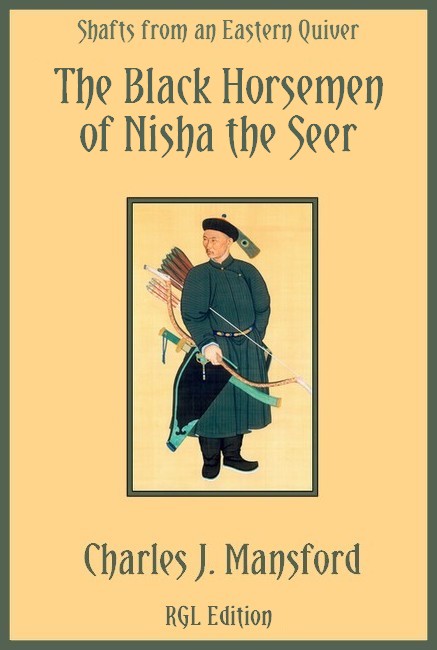
RGL e-Book Cover 2019©

RGL e-Book Cover 2019©

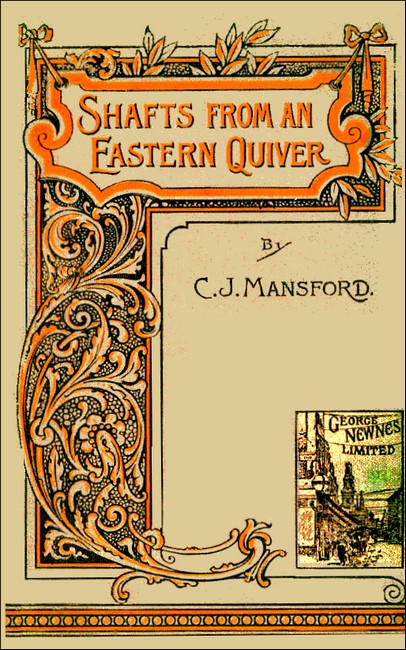
Shafts from an Eastern Quiver, George Newnes, 1893, with:
The Black Horsemen of Nisha, the Seer
THESE stories ... introduce the lover of sensations to a new writer, who is not at all unworthy to be placed upon the same shelf with Mr. Conan Doyle. He certainly contrives to give the three heroes of this book—the two Englishmen, Frank Denviers and Harold Derwent, and their marvellous Arab servant and good genius Hassan—as many hairbreadth escapes and other adventures by sea and land as can well be packed into a volume of less than three hundred pages.
Mr. Mansford appears to be most at home in Persia, Afghanistan, and India. But he does not confine his literary attentions to the more strictly Eastern countries; on the contrary, one of his most thrilling stories tells of the experiences of the fortunate three among Papuan wreckers, and another relates the escape of an exile from Siberia.
Undoubtedly Mr. Mansford has the gift of the story-teller, and besides, he uniformly writes like a scholar. The illustrations of the book, though small and unpretentious, are admirably executed, and enhance the piquancy—though that was hardly needed—of the letterpress.
The Spectator, 1 December 1894

"IT looks as if the grass had been set on fire," responded Denviers, in answer to a remark of mine, when I called his attention to a long, parched tract which formed a striking contrast to the rich verdure around it.
"Very likely that is the reason," I assented; "still, it seems strange that the rest of it should have escaped."
"The Englishman speaks truth," interposed Hassan, "the cause of what we see is far stranger indeed than those who have not travelled hither before would be inclined to suppose."
"I have not the slightest doubt but what Hassan has some mysterious and wholly imaginary explanation of it to offer," said Denviers to me in a low tone, then turning to the Arab, he asked:—
"Well, Hassan, can you enlighten us on the matter? What do the people of Khorassan conjecture about it?"
"It is no idle rumour, sahib, which is told concerning this scorched tract," answered our guide, "for they who have been the cause of it are surely the scourges of the plain through which we are passing, for tears and lamentation in despoiled households do they leave behind them, in obedience to the commands of Nisha, the Seer. But you are wearied with the long journey through the desert of sand and need the repose which the tent affords. At some other time I will explain the cause of this strange tract, even when we are safe in the lovely city of Meshed, or wander amid the plashing fountains and clustering roses of Nishapoor."
"Which is another way of saying that you prefer to tell us the cause when we shall be unable to test its truth, I suppose," interposed Denviers. The Arab shook his head gravely in sign of dissent.
"Allah forbid!" he exclaimed. "If you think that is my motive you wrong me indeed, since my only desire is to keep you from the danger which falls upon those who follow the black horsemen; for the parched tract which you see here, just where the desert gives place to the emerald verdure, has been made by the trampling of the hoofs of Nisha's phantom horses."
"Then, Hassan," said Denviers, quietly, "I think we will pitch our tent yonder," and he pointed to where a grove of majestic walnut trees stood out against the grey sky; "the night is fast closing in upon us, and I suppose that spectres, even in Persia, wander abroad in the still small hours, much as they do in other countries."
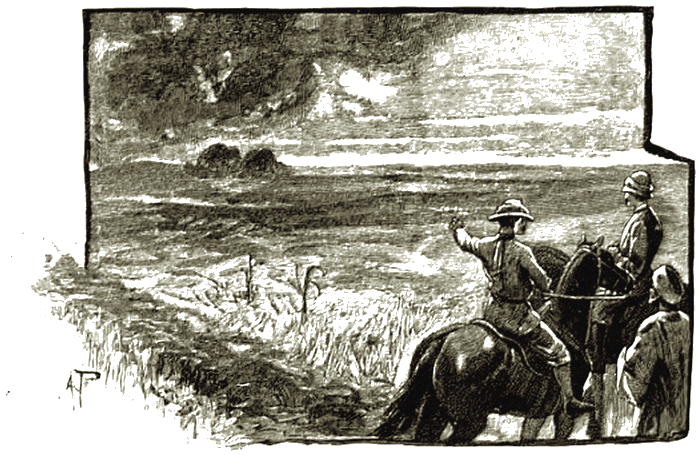
"I think we will pitch our tent yonder."
"Jest not, sahib," said Hassan, in the grave tone which he usually assumed when moved by the recollection of some Eastern tradition; "if you care to hear the story I will narrate it to you, but, by the beard of the Prophet, blame not Hassan if evil befall the Englishmen afterwards, for it is a true saying in the land of Khorassan that by his horsemen the Seer has lured many a brave man on to destruction."
"Pitch the tent, Hassan," said Denviers, impatiently, and as he spoke he dismounted from his steed and led it by the bridle towards the spot which he had pointed out to the Arab. A few minutes were sufficient for our horses to be securely hobbled, and as they leisurely cropped the grass before the front of the tent, we assumed a recumbent position while Hassan began his improbable story.
"IN the days when the Nasranee were the ruling people of
Persia," said the Arab, "Nisha, the Seer, was a mighty power in
the land ruled by On, the descendant of the Sun. He it was who
discovered a secret potion by which he gave renewed life to On.
So much did the monarch honour Nisha that the latter's name
became famous through all the spreading lands, which extended
from fair Chaldea to the silvery islands that float like crystal
stars in the Eastern seas, wherein even now the descendants of
the Shintos dwell."
"But these horses, Hassan," interposed Denviers, "what had On to do with them?"
"Patience, sahib," responded Hassan. "To Nisha, the Seer, came many wise men of the East, sent by the monarchs who ruled the lands far and near, for they feared On and would fain drink of this potion. But Nisha, faithful to On, loyally kept the secret, and was rewarded by the favours of his royal master.
"To On were born many sons, none of whom could hope to obtain sway over the land, since their parent was apparently rendered immortal. Among them was one who was proud and scornful, and wished to possess his father's throne, so he sought, but in vain, to win Nisha over to his cause. He knew that once each year the Seer prepared the potion in a crystal goblet, and that when the exact hour arrived On drank of it, and so there was added another year to his span of life. It fretted the son's proud heart to think that one day he would lie cold and passionless in the tomb while his father should still live on and reign over the land where diamonds and emeralds are the gems which adorn a sceptre.
"About him this son gathered a great following of youths as reckless and impetuous as himself, and together they formed a plot by which their leader might obtain the throne which he coveted. When the stated day arrived, On sought the abode of the Seer, and entered the tower wherefrom the stars could be seen, and where Nisha nightly increased his lore. As the monarch passed up the winding stairway a sound smote upon his ears. He halted for a moment and looked uneasily around, but nothing could be seen, for the alarmed conspirators hastily hid themselves behind the projecting angle of a mighty pillar. As soon as On had thrown himself upon some cushions to rest in the starlit chamber of the Seer until the appointed moment came when he was to drink the potion, the youths stole softly behind the heavy tapestry, and noiselessly making slits in it with the points of their daggers, watched the monarch and his subject. Nisha gazed at the stars in silence for hours, then at last he moved to a strangely-carved idol, and touching it, a hollow was revealed from which he drew forth the crystal goblet. Pouring into it a colourless fluid, he next threw into it what appeared to be a ruby, and as a faint sweet fragrance, like that of a blossoming almond vale, seemed to perfume the apartment, he placed the goblet in the hand which the monarch eagerly extended to grasp it.
"The draught was at the lips of On when out sprang those who had been concealed by the hangings. In a moment the crystal goblet was dashed violently from the monarch's hand, and, falling to the ground, shivered into a thousand pieces! Among the conspirators, the frenzied On seemed to rest his eyes upon one alone—his own son! With a wild cry of anguish he covered his face with his hands and fell dead upon the marble floor!
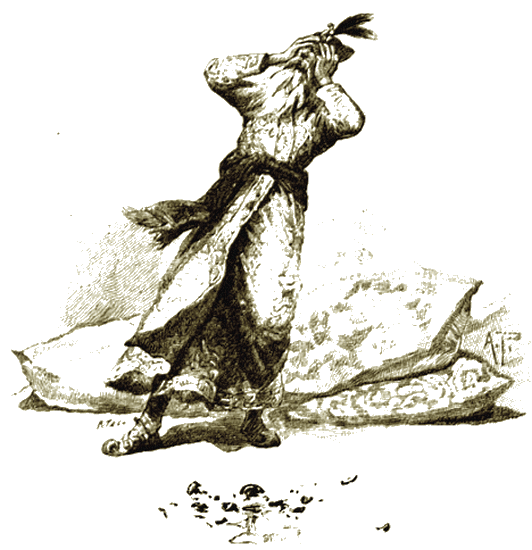
"With a wild cry of anguish he covered his face with his hands."
So the son of On obtained the throne and tried to make the Seer his friend, but the latter resolutely shunned the advances of the haughty ruler, and shut himself up in the tomb of On, into which few indeed dared to follow him. At last this monarch in turn grew old, and determined to wrest the secret from Nisha, but upon the band of horsemen sent to capture him and to carry him a prisoner to the monarch's palace, Nisha laid a potent spell which bound them motionless until the time when he had need of them. Thus the son perished when old age seized him, Nisha living to enjoy the tidings of the monarch's death. Then, it is said, he began to take vengeance upon the people who had supported the hated one's cause, for he had heard that they said On had lived so long that he grew hateful to them, and their changeful hearts longed for a new ruler. Through all the years which have passed Nisha still has lived, and his vengeance is not yet complete. The wayfarers who cross these plains at night have indeed had reason to lament the terrible crime of the son of On and the exaction of its requitement. Upon them suddenly steals a band of horsemen who snatch up the incautious wanderers and bear them away shrieking at their doom, for they are rarely again seen alive by mortal men. The people of Khorassan declare that they are gathered round the dead body of On in an enchanted crowd, and hold up their living yet lifeless hands in vain supplication to Nisha, who stalks among them a strange semblance of humanity. Distorted with age, his long, shrivelled arms reach to his feet as he holds the captives motionless with the glare of his red, birdlike eyes."
"A most interesting story, Hassan," said Denviers, when the Arab had finished; "and you really believe that Nisha has lived since the time when the Chaldeans studied the stars from the top of Babel's uncompleted tower?" and he whistled irreverently.
"The mind of man is a well unfathomcd, none know its depths," responded Hassan. "If Allah and the Prophet will it so, why should not Nisha become immortal?"
"Well, Hassan," I interposed, "I must confess that I should like to see both the horsemen and the tomb before accepting your story as true."
The Arab looked gravely at us as we reclined upon the cushions of our tents.
"Rest now," he answered, "and your guide will watch at the door of the tent. If the band of riders should chance tonight to cross the path yonder, I will surely awake you that your eyes may rest upon them."
WORN out with the days of long, dreary riding which we had endured in our journey from Demavend to Khorassan, we had sunk into a profound sleep, when Hassan entered the tent and hastily aroused us.
"See for yourselves, sahibs!" he exclaimed, "the band is returning to Nisha, and bearing away some shrieking captive!"
We sprang to the door of the tent and looked out. The sky was growing overcast with clouds, through which at fitful intervals the light of the moon struggled and lit up the scene around. A breeze sprang up for a few minutes, and as the clouds scudded before it, there was revealed to us a strange spectacle.
A band of scantily-attired horsemen bestrode about twenty black steeds, while across the front of one of their number was thrown the writhing body of a man whose cries were expressive of the utmost terror. As the horsemen moved at a somewhat swift pace, we noticed that a sound was made by the hoofs of the horses, although their riders sat in their saddles as motionless as the dead. One strange circumstance was noticeable, which was that the horsemen were apparently of a different race to the man whom they were carrying off; indeed, they resembled the natives of Africa in colour so far as we could make out when the moonlight streamed down upon them.
"Hassan is certainly mistaken in supposing that these horsemen are spectres, or their steeds either," said Denviers, "the hoofs of the horses make too much noise for us to accept that theory." Then, turning to the Arab, he exclaimed:—
"The horses, Hassan, quick! for your life!"
It took scarcely a minute to unhobble them and for Denviers and I to mount our sturdy Afghans, yet the distance between us and the retreating band had increased considerably. Without waiting for saddles we flung ourselves upon the animals and set off at a breakneck speed. The black horsemen soon appeared to become aware of our pursuit of them, for they quickened their pace considerably, and as they did so the captive, hearing the heavy thud of our horses' hoofs striking the ground behind, redoubled his struggles and cries for help.
On we went, faster and still faster! Flinging the reins from our hands, we leant forward and clasped the necks of our horses, as they flew along like the wind. The clouds above us grew more compact and lowering, and for a few minutes the only guide which led us on in our mad career was the mournful, appealing cry which came from the captive.
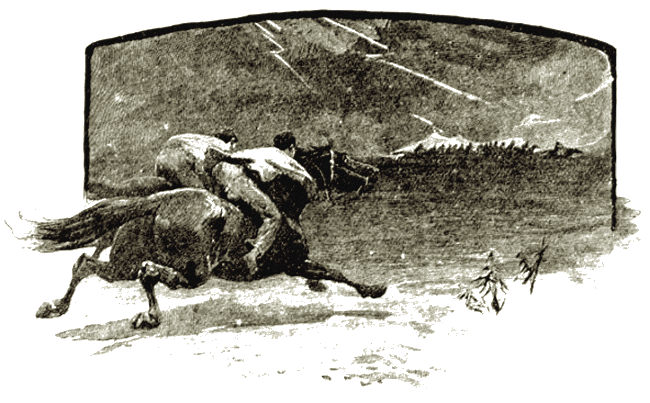
They flew along like the wind.
"How much longer can we keep up such a pace as this?" I gasped out, as Denviers seemed to be leading a little, while my own steed was beginning to show signs of exhaustion.
"Can't say," he answered laconically, "we started to save this man, and the horses can have no respite till that is accomplished."
His words inspired me with new confidence, and I urged on my horse with all the expressions which I had heard Hassan use when coaxing it.
The rumble of thunder, followed by a few very heavy drops of rain, convinced us both that to our other perils would be added the discomfort of riding half clothed and with our heads uncovered through a storm the severity of which, at that time of the year, we knew from experience would be considerable, although it would possibly be of short duration. The rain now began to descend in torrents, the effect upon our horses being happily to refresh their flagging energies, for they seemed to dash onward faster than ever. The man's cries were borne louder upon our ears, and we knew that we were drawing nearer to him, so that the prospect of rescuing him seemed to us more hopeful.
Suddenly the storm broke. From across the mountain peaks darted a vivid flash of lightning, followed instantaneously by a terrific peal of thunder, which made our frightened horses gallop forward entirely beyond our control. On we went, till suddenly, to our horror, another blinding flash revealed that before us was a chasm stretching as far as the eye could reach.
With all our might we struggled to restrain the horses, but in vain. Over the side of the chasm apparently those whom we were pursuing went; there was another wild shriek from the captive, and the next moment our horses, recognising the danger when too late, reared almost perpendicularly, then fell headlong down the abyss!
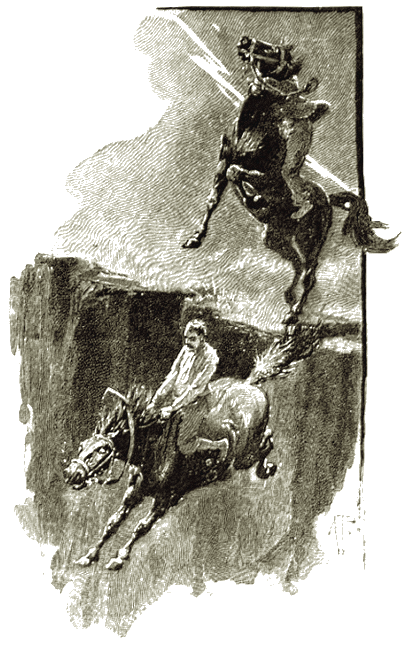
Headlong down the abyss!
I closed my eyes and felt a strange choking in my throat as we went sheer down, and the horse quivered in terror beneath me. A sensation of drowning appeared to ensue, then the air seemed to fan my cheeks, and wonderingly I opened my eyes again and looked around for my companion. We had fallen into a deep ravine, through which swept a wide mountain torrent, and the horses were now swimming rapidly with the fierce current.
"What an escape!" I called out to Denviers, as I saw him still clinging to his horse.
"I don't know that we have much to be elated about," he answered, "the sides of the ravine are almost perpendicular, apparently; to climb them is impossible, and it is quite likely that the current may bear us away into some greater danger."
Again the cry of the peasant sounded upon our ears—this time beyond the seething waters.
"Keep with the stream!" Denviers exclaimed. "He has evidently been carried down that way. After such an effort as this we shall surely rescue him!"
"Don't you think that this torrent is becoming more rapid?" I asked, as my horse breasted the waters and carried me close to Denvier's side. He looked at the current steadily, then replied:—
"I am inclined to think that it is; watch carefully, and, if you see anything to cling to, make for it, and I will turn my horse's head that way and try to follow you."
I was now leading the way by a few yards, and soon found that my fears were well grounded, for the stream began to sweep along at an alarming rate, while in the distance a roar as of waters confined to narrow limits seemed to indicate that further danger lay lead. We knew that an attempt to return would be useless, and on looking up observed that the sides of the chasm now met in a vaulted roof of a reddish colour, through which a light seemed occasionally to steal, from which we concluded that the storm was over, and that the moon was shining forth once more.
The noise of the waters now became almost deafening, and we could descry that ahead of us was a narrow passage scarcely large enough for a man to pass through, for rocks seemed to rise like buttresses on either side of it. I pointed to the narrow defile, and asked my companion:—
"Do you think that we can get through that on horseback?"
"I am afraid not," he answered, "and, considering the splendid way in which our horses have behaved, I think we ought to give them an equal chance with ourselves."
As he spoke, Denviers unclasped his arms, which had hitherto been round his horse's neck, and a moment afterwards was swimming with a grand stroke amid the waters. I raised myself from my own horse, and, plunging into the stream, followed my companion, who was within a few yards of the rocks on either side.
"Grasp the buttress on the left," he called out to me; "I will hold on to the other."
I drew a deep breath, and waited for the torrent to hurl me forward. One slip, and I knew that a moment afterwards my body would be sucked into the seething gulf in front, and then all would be over. My hands clasped the buttress firmly, and, steadying myself for a moment, I drew my body slowly out of the water.
When I had climbed up hand over hand in this way for several yards, I saw Denviers was already leaning over from what appeared to me to be a huge stone lattice. He stretched out his hands, and, seizing me, dragged me half senseless and exhausted behind it. Resting there until the strain of the efforts which I had made seemed to become less oppressive, I began to observe, in the dim light, the shape of the bases of the pillar which rose from the stone platform on which we were. I traced out the representations of two gigantic feet, just as Denviers looked upwards and exclaimed suddenly:—
"Look at the shape of this support, which reaches to the arched top of the chasm! Surely it is some monstrous idol!"
We drew close to the lattice-work and, standing with our backs to the latter, found ourselves facing an enormous idol, which we subsequently discovered was the grim guardian of one of the entrances to the tomb of On.
Its repulsive-looking head, adorned with enormous ears, was of a type similar to that of the Nubian race, and was bare of covering. Across its swarthy breast passed a carved band which interlaced a garment bound at the waist by a belt which supported the representation of a loosely-hanging garb reaching to the knees. In one of its giant hands it held a curved sword, while the other was raised to grasp a serpent which twisted in mazy coils about the idol's body.
"The entrance to the tomb of On, without doubt," said Denviers. "I wonder if we shall ever get out of it again!" We moved past the enormous image and found ourselves facing a massive stone door, which yielded readily as we pressed upon it, and then a moment afterwards we saw before us a wonderful natural hollow apparently in the heart of the mountain, for we were in the tomb of On!
JAGGED and red, from the sides and roof of this gigantic tomb huge boulders protruded, while, lying stretched upon a low bier, was the body of the dead On, apparently embalmed, and conspicuous among the others round it by its length; for the dead king must have been much beyond the stature of the present race of men. A look of infinite despair was upon his face; the hands of the monarch were joined upon his breast, while in them was clasped the handle of a massive sword, the blade of which rested upon his silent form.
Peering cautiously out from the position which we had taken behind one of the many boulders which strewed the floor at intervals, we soon discovered the real use to which the tomb was put. Close beside the entrance through which we had come was another, through which the moonlight streamed into the tomb, and apparently led in a direction the same as the ravine into which we had leapt. From this we conjectured that, had we ridden a little further up, we might have succeeded in turning our horses' heads into the entrance of it, and so have avoided the peril in which we had been placed. The man's cry had not come to us from in front, as we had thought when breasting the waters, but from this second entry to the tomb. Looking down the entrance we saw several of the horses behind which we had ridden haltered by a rope to some projecting fastenings in the rocky wall.
The tomb itself was no mere charnel house despite the many bodies which we saw ranging through it. By the side of the dead On we observed the form of one who must have died of extreme age, and from the description which Hassan had given us, we judged that this was the body of the Seer whom the credulous people of Khorassan believed to be still alive.
The real ruler of the tomb was a negro much like the riders whom we had seen and tracked over the plain. From the throng of men which surrounded him and were evidently narrating the capture of the victim who stood among them, we easily distinguished this leader from the abundance of the jewellery which he wore. His limbs were scantily-clothed, but his arms and ankles were heavily bound with bracelets, while round his thickly-matted hair where it reached his retreating forehead was a single hoop of gold, in the centre of which a jewel was set, and which heightened with its flashing light the contrast between its white brilliancy and the intense black colour of the wearer's face.
"Let us get closer to them," whispered Denviers, "and try to learn what the fate of the captive is intended to be." We moved nearer to them, cautiously hiding behind another boulder.
"At present we are unobserved," I began, "and the men evidently find too much pleasure in taunting their captive to set a watch upon the tomb."
As if the hideous negro wished to contradict my words, a shrill scream of laughter rang through the tomb; then a voice exclaimed:—
"Come nearer, thou enemy of On, the mighty one, come, that thou mayest join in the number that are doomed to appease his Great Shade."
We saw the captive fling himself wildly at the feet of this strange being as he cried:—
"Spare me, and I will worship at the tomb of On until the sands of my life are run out!"
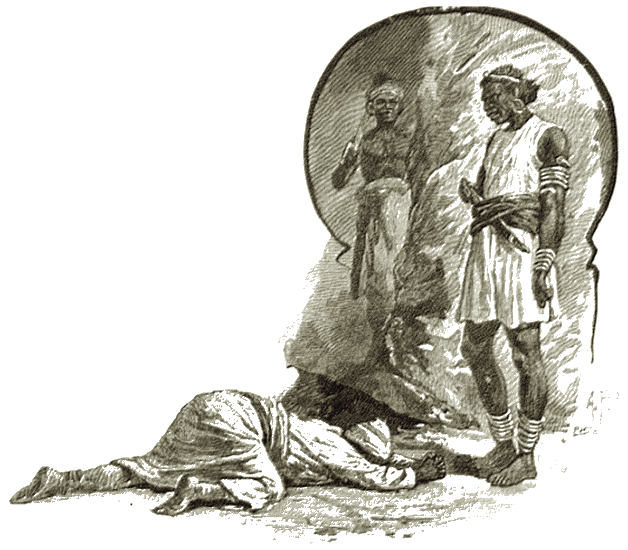
"Spare me!"
The negro uttered an appalling laugh of derision as he answered:—
"Art thou not of the plain of Khorassan, over which pass many whose wealth makes the eyes of my slaves glad when they look upon it?"
"Frank," I whispered, "this is a band of marauders who have migrated to this tomb, and who rob the people around with impunity because the credulous people think they are not mortals."
"Exactly what I thought when Hassan told us about them, but listen to the questions which they are putting to this captive," he replied. We ceased our conversation and heard the captured one reply:
"I swear by the Koran I am poor; I could not pay one tenth of such a sum!"
"Then there is for thee no escape," answered the black ruler, "surely thou shalt die!"
He made some movement with his hand, in response to which the men around attempted to seize their captive. The latter turned and made a sudden attempt to escape. He had darted past the boulder behind which we had hidden, when the foremost of the slaves reached him. Just as he did so Denviers wrenched the sword from the hands of the dead On, near to which we had stealthily crept, and thrust himself between the captive and his pursuers.
"Back!" he cried, "lay but a hand upon him and all the magic of the East shall not save the one who does so from the fate which he deserves."
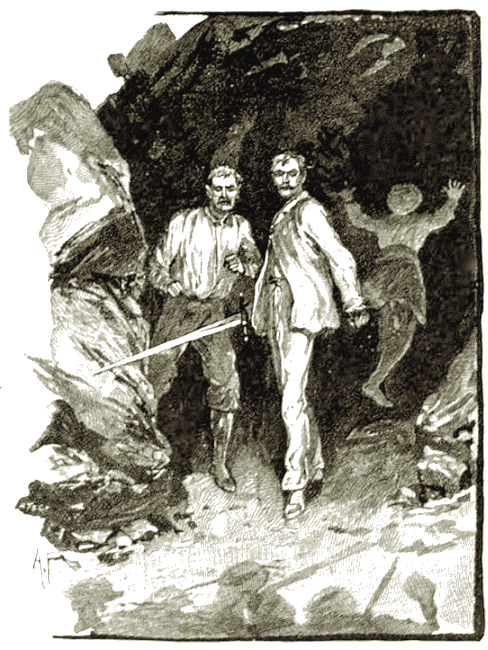
"Back!" he cried.
The men stopped for a moment, astonished at our sudden appearance, and then, as we heard the captive retreating down the tomb to the second entrance, we turned and followed him. In a moment we had flung ourselves each upon one of the horses that stood there, and slashed hastily through the halters which held them, and then, as the captive led the way, we dashed wildly through the ravine, closely followed by some of the horsemen. It was a race for life that we long afterwards remembered, but, as we urged on our horses, we found that our pursuers were dropping behind, and looking back we saw them in a discomfited crowd watching us with surprise as we galloped over the plain after passing through the ravine. We stopped at last, and while the captive insisted on riding home on the horse which he had so strangely acquired, we dismounted, and turning the animals in the direction whence they had come, saw them rush riderless back towards the tomb.
The peasant, poor fellow, was full of gratitude to us for rescuing him, and called on Allah to reward us. We parted with him some distance after we emerged upon a green and level plain, and having scanned it narrowly, my companion pointed towards the East, exclaiming as he did so:—
"If I am not mistaken, Harold, yonder are the trees under which we pitched our tent."
I looked in the direction indicated and saw the majestic grove of walnut trees which we had left when we set out to follow the black horsemen. Hassan, who was within the tent, came out as he heard footsteps approaching:—
"The Sahibs have lost their horses?" he said, in his grave inquiring tone, "and have been absent from the tent for many hours, which brought much anxiety to their faithful slave."
"Well, Hassan, as that is the case," said Denviers lightly, "you will have the pleasure of purchasing two more for us."
"The lightest word of the Sahib is as a law unto Hassan," responded the Arab.
"No doubt!" said Denviers, then turning to me he added:— "And I daresay he will make a tolerably good bargain, for our faithful guide doesn't usually forget himself on such occasions!"
Indeed, the amount of backsheesh which our grave Arab levied before the day was over from a village horse-dealer of Sultanabad was a convincing testimony to the truth of Frank's remark.